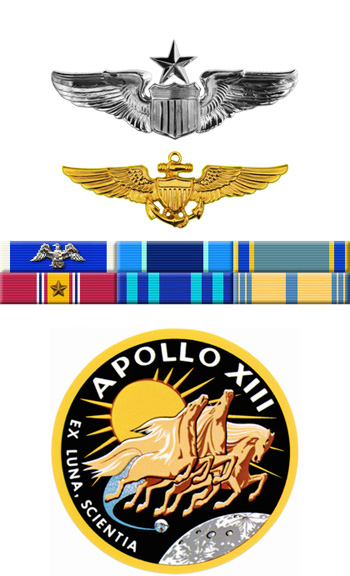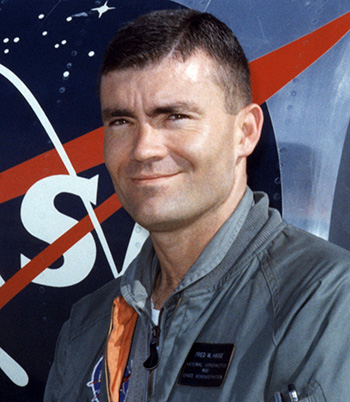
|
Fred W. Haise, Jr. |
 |
|||
| Rank, Service | ||||
Captain O-3, U.S. Air Force |
||||
| Veteran of: | ||||
|
||||
| Tribute: | ||||
Fred Haise was born on November 14, 1933, in Biloxi, Mississippi. He enlisted in the Naval Aviation Cadet program of the U.S. Navy in October 1952, and was commissioned a 2d Lt in the U.S. Marine Corps and designated a Naval Aviator in April 1954. His first assignment was as an F2H-4 Banshee pilot with VMF-533 at MCAS Cherry Point, North Carolina, followed by service as an F9F-8 Cougar pilot with VMF-114, also at MCAS Cherry Point, until leaving active duty in 1956. While attending engineering school at the University of Oklahoma, Lt Haise joined the Oklahoma Air National Guard, serving as an F-80 Shooting Star and F-86 Sabre pilot with the 185th Fighter Interceptor Squadron from March 1957 to September 1959. He next served as a research pilot at the NASA Lewis Research Center in Cleveland, Ohio, from September 1959 to March 1963, and during this time he also served as an F-84 Thunderstreak pilot with the 164th Fighter Squadron of the Ohio Air National Guard, having served on active duty for the 2nd Berlin Crisis from October 1961 to August 1962. Capt Haise left military service in 1963, and continued his service with NASA as a research pilot at the NASA Flight Research Center at Edwards AFB, California, from 1963 until he was selected by NASA as an astronaut in April 1966. Haise was lunar module pilot for the Apollo 13 space flight from April 11 to 17, 1970, and then served as technical assistant to the Manager of the Space Shuttle Orbiter Project from April 1973 to January 1976. From June to October 1977, he served as commander of one of the two 2-man crews who piloted the Space Shuttle Enterprise during approach and landing test flights at Edwards AFB. Fred Haise retired from NASA in June 1979. |
||||
|
||||

